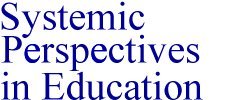

 |
 |
|
A selection of of websites devoted to whole systems change in education i.e. restructuring based on either systemic theory, holism or a wisdom perspective. Public School Restructuring Comprehensive
Bibliography
Public School Restructuring Comprehensive
Bibliography
Bela Banathy: Idealized Social System
Design for Schools
What educational change agents should
know about systems theory: by Irja Haapala (Quoting Banathy)
http://enhanced-designs.com/stct/ Association for Supervision and Curriculum Design (ASCD). Goals and Purpose of the Network:
* to aid in the development of curriculum designed to include the "new sciences" * to encourage the practice of systems thinking as a shift in world view that will fit better with the new understanding of our universe * to present this new information and point of view in language that is useful and relevant for all people who are stake holders in a viable system of education * to maintain an active global electronic communication network, to provide support for educators who are "exploring new worlds where no one else has gone before. ASCD Change Agency Network
The Change Agency Network is a collaborative venture sponsored
by a consortium of organizations: ASCD International, the Alberta
Affiliate of ASCD, the Centre for Leadership in Learning, the University
of Calgary, and Apple Canada. You can learn more about The Change Agency
Network and its sponsors by checking either of these websites:
Guide to Ecoliteracy, A New Context for School Restructuring. Center for Ecoliteracy. " Author Fritjof Capra, together with a team of educators and systemic thinkers, provides a refreshing introduction to the theory of living systems and ecological literacy. Discussions of interdependence, sustainability,and ecological cycles are followed by case studies of classrooms that have been transformed into learning communities founded on these concepts. Global Learning Communities
Global Learning Communities is based on the principles of:
* cooperative learning process and compassionate/collaborative practice * local and global citizenship * systems, choice and brain based learning theory * holistic education * indigenous wisdom and ecolearning Greg Cajete
Motivating American Indian Students in Science and Math.
ERIC Digest., Cajete - From the ERIC database. Motivating American Indian
Students in Science and Math.
Native Ways of Knowing
Native Ways of Knowing: What Science Educators and Curriculum Committees Should Consider About Native World Views (adapted from the Alaska Indigenous People's Framework). Holistic Education Home Page
Covers Principles of Holistic Education; Practice of, Courses in; Conferences related to; Resources, related websites. Holistic Education Review
Ontario Institute for Studies in Education-
Holistic Education
Holistic education is rooted in holism, or the concept
of an interconnected reality. Holistic education attempts to facilitate
connectedness within the curriculum and within students. Integrated curriculum
which attempts to connect various subjects is one example of holistic education.
Holistic instructional strategies include visualization, cooperative learning,
creative problem solving strategies and drama. However, holistic education
avoids emphasis on one particular technique but instead stresses a multi-level
approach to education that acknowledges interdependence and connectedness.
At OISE there are activities related to holistic education in field development,
graduate studies and research/writing.
Holistic Learning Breaking New Ground:
International Conference October 24-26, 1997, Ontario Institute for
Studies in Education of the University of Toronto
Key note speakers include Anna Lemkow, John Seed, Sharon
Saltzberg and Nel Noddings. This conference explores learning as
a process that engages the body, mind, emotions and spirit. Fifty-five
workshops, in three strands, focus on many aspects of holistic learning
for adults, youth and children.
|